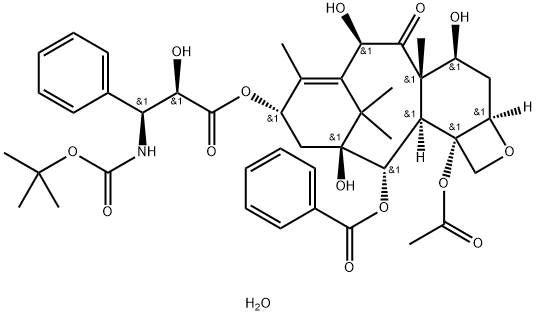Pharmacology
Docetaxel principally exerts its cytotoxic activity by promoting and stabilising microtubule assembly while simultaneously preventing microtubule depolymerisation. This results in inhibition of normal cell division. In vitro and in vivo, docetaxel has antineoplastic activity against a wide range of cancer cells, demonstrates synergistic activity with several antineoplastic agents and often has greater cytotoxic activity against human breast cancer cell lines than paclitaxel. Docetaxel, binds to and stabilizes tubulin, which prevents physiological microtubule depolymerization/disassembly and results in cell-cycle arrest at the G2/M phase and cell death. This agent also is known to inhibit the anti-apoptotic gene Bcl2 and to encourage the expression of p27, a cell-cycle inhibitor, and further pro-angiogenic factors such as vascular endothelial growth factor (VEGF). Docetaxel is mainly metabolized in the liver by the cytochrome P450 CYP3A4 and CYP3A5 subfamilies of isoenzymes, and its clearance has been shown to be related to body surface area and hepatic enzyme and alpha1 acid glycoprotein plasma levels.
Tolerability
The tolerability of docetaxel in comparative clinical trials was generally acceptable. Severe neutropenia affects most docetaxel recipients, with febrile neutropenia occurring in approximately one-eighth of patients. Dose-cumulative severe fluid retention was reported in docetaxel recipients, despite premedication with prophylactic corticosteroids. Other adverse events include asthenia, stomatitis, infections, neurosensory, cutaneous or gastrointestinal events, nail changes, severe fever in the absence of infection, myalgia and hypersensitivity reactions.
Chemical Properties
White Crystalline Powder
Uses
An antineoplastic. An antimitotic agent that promotes the assembly of microtublules and inhibits their depolymerization to free tubulin
Uses
Docetaxel Trihydrate is an anti-cancer drugs; Semisynthetic analog of the taxane paclitaxel.
Definition
ChEBI: The trihydrate form of docetaxel. It is used for the treatment of breast, ovarian, and non-small cell lung cancer, and with prednisone or prednisolone in hormone-refractory metastatic prostate cancer.
brand name
Taxotere (Sanofi Aventis).
in vivo
In female mice, the Docetaxel Trihydrate (RP-56976 Trihydrate)-induced intestinal apoptosis in the 14-hours after light on (HALO) group is significantly greater than that in the 2-HALO group. Bax expression is significantly elevated by Docetaxel in the 2-HALO group, but not in the 14-HALO group. On the other hand, cleaved Caspase-3 expression is significantly elevated by Docetaxel in the 14-HALO group, but not in the 2-HALO group. The expressions of Wee1 and phosphorylated CKD1 are significantly elevated after dosing of Docetaxel at 14 HALO, but not at 2 HALO. In addition, Docetaxel significantly reduces survivin expression in the 14-HALO group but not in the 2-HALO group. The survivin expression level in the Docetaxel-treated 14-HALO group is significantly smaller than that in the drug-treated 2-HALO group[3]. Piperine (PIP) is administrated via intravenous bolus at 3.5 mg/kg and via oral administration at 35 mg/kg and 3.5 mg/kg, while Docetaxel (DOX) is intravenously administrated at 7 mg/kg to Sprague-Daley rats. The co-administrations of PIP at 35 mg/kg via oral administration and Docetaxel at 7 mg/kg via intravenous bolus administration in Sprague-Dawley rats. The combination use of PIP and Docetaxel results in a synergic increase of both their in vivo exposure[4].





